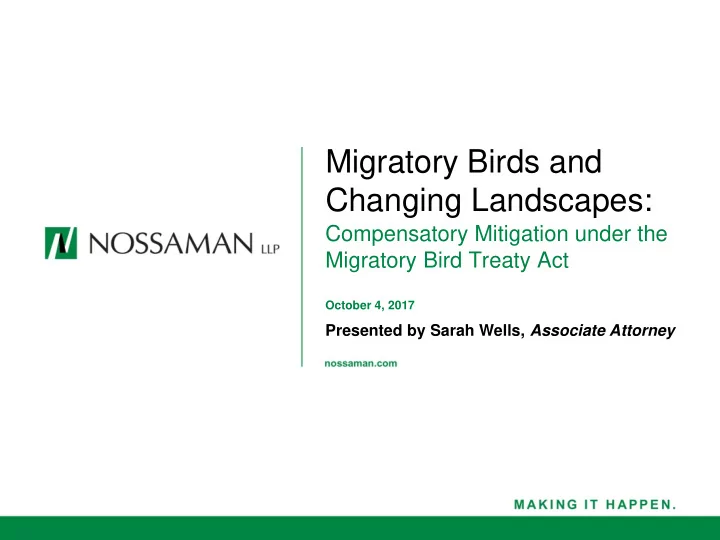

Migratory Birds and Changing Landscapes: Compensatory Mitigation under the Migratory Bird Treaty Act October 4, 2017 Presented by Sarah Wells, Associate Attorney
Overview ▪ What the MBTA says ▪ How the MBTA has been interpreted across time and place ▪ Recent developments of Obama and Trump administrations ▪ Going forward 2
The Migratory Bird Treaty Act of 1918 (MBTA) “[U] nlawful at any time, by any means or in any manner, to pursue, hunt, take, capture, kill, attempt to take capture or kill, possess, offer for sale, sell, offer to barter, barter, offer to purchase, purchase, deliver for shipment, ship, export, import, cause to be shipped, exported, or imported, deliver for transportation, transport or cause to be transported, carry or cause to be carried, or receive for shipment, transportation, carriage, or export, any migratory bird, any part, nest, or egg of any such bird, or any product, whether or not manufactured, which consists, or is composed in whole or part, of any such bird or any part, nest, or egg thereof included in the terms of the [Migratory Bird Conventions].” 16 U.S.C. § 703(a) (emphasis added). 3
MBTA of 1918 ▪ First major federal wildlife law ▪ Strict liability criminal statute ▪ Covers over 1,000 avian species ▪ Implemented treaty with Great Woman wearing a “Chanticleer” Britain (Canada) hat made of bird feathers, circa 1912. Library of Congress ▪ Claimed as a first major victory by the National Audubon Society, founded in 1905 in response to depletion and extinction of species hunted for sport or for millinery 4
Concept of “Take” ▪ The fundamental question: What is “take”? ▪ USFWS defined MBTA “take” to mean: – “to pursue , hunt, shoot, wound, kill, trap, capture or collect or attempt to pursue, hunt, shoot, wound, kill, trap, capture or collect” 50 C.F.R. § 10.12. ▪ Concept of incidental take in MBTA context only arose after advent of more modern environmental laws ▪ USFWS interpretation of MBTA applicability to incidental take first occurred in enforcement actions in 1970s 5
Circuit Split on MBTA “Take” Prohibition ▪ 5th, 8th, and 9th Circuits: – “Take” limited to deliberate acts done directly and intentionally to migratory birds, not unintentional effects of commercial activities – MBTA concerns physical conduct of the sort engaged in by hunters and poachers ▪ 2d and 10th Circuits: – MBTA prohibits incidental take ▪ 2015 Fifth Circuit CITGO Petroleum decision encapsulates the split 6
Compensatory Mitigation ▪ Tied to interpretation of “take” prohibition – Impacted by Circuit in which project occurs ▪ No permit available – Only exercise of favorable enforcement discretion ▪ Has been sought for impacts to migratory birds and impacts to habitats – E.g., tens of millions in “voluntary conservation” by linear projects 7
MBTA Developments During Obama Administration ▪ Enforcement focus paired with rulemaking steps – May 2016: USFWS Notice of Intent to prepare programmatic EIS for an MBTA incidental take permit program – Jan. 2017: DOI Solicitor’s Memorandum, “Incidental Take Prohibited Under the Migratory Bird Treaty Act ” (Opinion M -37041) 8
Recent Developments ▪ Solicitor’s M -Opinion – Temporarily suspended on Feb. 6, 2017 – Not formally rescinded/replaced ▪ MBTA incidental take permit program – Withdrawn from DOI Unified Agenda on April 11, 2017 – DOI to assess further, determine whether initiation of a new rulemaking on this withdrawn item in the future is appropriate 9
Going Forward ▪ Circuit split endures ▪ Uncertainties and risks persist ▪ Pendulum prospects ▪ Legislative approaches possible 10
Questions? For more information, contact: Sarah Wells Nossaman LLP 816 Congress Ave., Ste. 970 Austin, Texas 78701 Phone: (512) 813-7954 Email: swells@nossaman.com 11
Recommend
More recommend